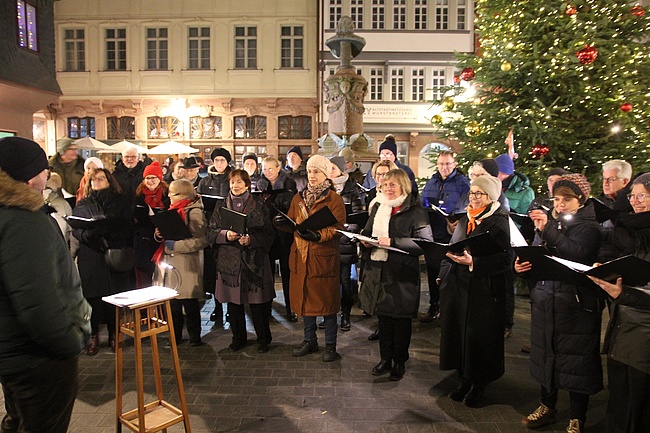It was an unusual picture in the current situation: the Römer was well filled for the first time in weeks. Not with people, though, as they are thankfully still largely abiding by the current spacing rules. It was 1,000 empty chairs that filled the square in front of Frankfurt's city hall today. With this action, the Initiative Gastronomie Frankfurt e. V. (IGF) responded to a call by the Frankfurt City Council. (IGF) followed a call of the gastronomy network Leaders Club Germany, which initiated a nationwide day of action for today, Friday, to draw attention to the precarious situation of the gastronomy. In addition to Frankfurt, there were empty chairs in central squares in 74 other German cities, symbolizing empty restaurants. In Frankfurt, the demand of the IGF and DEHOGA Hessen is that the city should set up a municipal aid fund for businesses particularly affected and not make any cuts to the budget of the Frankfurt Tourismus- und Congress GmbH.
At least there is already a small ray of hope in the current situation in the form of the federal government's recent decisions to temporarily introduce the reduced VAT rate for the catering industry and to increase short-time working allowances. "This is a big step forward and we thank everyone whose persuasive work for the industry is now showing results, which of course includes our federal association DEHOGA. However, we must now look at how to prevent the mass death of gastronomic businesses until the measures take effect," notes Leaders Club President Michael Kuriat. However, there is still a need for improvement in these essentially positive measures.
Call for more support
"We are very happy and grateful that our concerns are finally being heard by politicians," stresses Patrick Rüther, Chairman of the Board of Leaders Club Germany. But unfortunately, he says, the measures announced are of only limited help to the hospitality industry. "The increase of the short-time allowance from the fourth month onwards misses the needs of our employees, since we hope, after all, that we will have long since re-employed them to at least 50 percent by then", explains Leaders Club board member Kerstin Rapp-Schwan. "They need more support immediately!"
No resilient perspective
Also, the temporary reduction of the VAT on food to seven percent from July onwards is considered good and right by all gastronomy associations. However, "The seven per cent will apply to significantly reduced revenue: Due to the urgently needed distance and hygiene regulations and the expected change in guest behaviour, we expect 50 per cent less revenue. The time limit also offers no resilient prospect for repaying the loans we took out during the crisis." Without immediate subsidies, many gastronomic businesses might not even see July 1, Rüther fears. "Also, the seven percent should be applied to beverages as well, otherwise bars and beverage-heavy restaurants will be left behind."
Gastronomy needs security
Further crucial for the industry is a roadmap, when and under what conditions gastronomy in Germany may reopen. "We are happy that things are moving forward. But we need more certainty to be able to plan for the summer and beyond," says Kerstin Rapp-Schwan. "We finally expect binding guidelines for our industry to prevent the spread of the virus in our businesses and are happy to contribute to this."
The problem here is of course - as in all areas of public life - that clear roadmaps are hardly possible in a situation that changes virtually every day. But general directions are quite possible, which can then be adjusted at short notice if necessary.
Action day today 24. April
And in order to demand a clear signal from the politicians, today just this creative protest action action #LeereStühle went to the start, in which restaurateurs throughout Germany have participated. "In the process, infection control had the highest priority for us", Michael Kuriat underlines. "The aim was to have as many chairs as possible, but as few people as possible on the seats. All participants were called upon to ensure that no colleagues, employees or guests came to the action sites."
The statement of the IGF in detail:
1.We are grateful for the decisions made so far by the federal government and the state of Hesse. We feel the appreciation and recognize the will to help. At the same time, the policy is pragmatic, but not consistent enough. Perspectives and the shoulder conclusion with the hotel and restaurant trade are missing. In addition, the aid programs are not sufficient.
2.The employees in the hospitality industry are the pillars of our companies. Salaries in the industry are not high, tips are often the "salt in the soup" and an important component of income for many. For many, therefore, a 60 percent short-time allowance means a real income of only 40 percent compared to their regular income. It is important to help these employees now, many of whom will have to apply for basic benefits. We welcome the fact that they now have extended opportunities to supplement their salaries with part-time jobs. However, we would have liked to see the lowest salary levels receive a top-up to the short-time allowance already from the month of May.
3.The latest decision on the temporary reduction of VAT to seven per cent on food is an important step because it shows medium-term prospects. However, we would have liked it to last longer than a year because we expect significantly lower sales as a result of the expected clearance rules and hygiene measures and will therefore take longer to repay the loans we are now taking out. The industry will achieve a maximum of 50 to 75 percent of the old sales level in the first year after opening. Trade fairs, tourism and events, i.e. important revenue generators, will be out of action for longer. Furthermore, we criticize that the tax cut only affects a subset of the gastronomic businesses, even if that represents the majority of businesses.
4.The industry is suffering massive liquidity problems as a result of sales drops of between 70 and 100 percent with ongoing costs. The companies must pay next week again the wages in advance, because the payment or reimbursement of the short-time allowance continues to be delayed. Rents are only deferred, so they have to be paid when operations resume. It is therefore all the more important that we quickly obtain the rescue fund demanded by us and the DEHOGA with direct financial aid for all companies in the industry. Without direct financial aid, many will not survive this crisis and thus will not even be able to benefit from the reduced VAT rates. Even the healthiest business cannot cope with months of no sales and continued high costs, especially high rents. The amount of individual financial aid should be based on the size of the business, its turnover and the duration of the closure. The simplest gauge is tax performance in 2019. Without emergency relief measures, at least 30 percent of businesses will not live to see July 1.
5.We need federal and state support in dealing with the insurance industry, which, despite existing business closure insurance policies, does not want to pay for the damage incurred or offers businesses "handouts." The insurance industry must be held accountable.
6.Where the state, county or municipality is the landlord or lessor of food service establishments and hotels, we need a rent waiver of at least 30 percent. This is where the public sector needs to lead by example. Deferrals do not help and are not fair, as the tenant alone must pay for the damage caused through no fault of his own.
7. It will remain very important that the federal and provincial governments give the industry a perspective on reopening in their next exchange on April 30, 2020. Many companies are facing the decision to go into massive debt as a result of the crisis. The impact will be felt by the industry for many years to come. In business terms, it is tantamount to hara-kiri to take this step without a concrete perspective. Therefore, a coordinated roadmap is needed. Here, too, the gastronomes and their associations are making a very concrete contribution and showing which protection concepts the industry is developing. Because there is no question: for our hospitality industry, the health of guests and employees is a top priority.
About the IGF:
The IGF was launched at the end of 2015 and, under its Chairman of the Board Madjid Djamegari and his Deputy James Ardinast, advocates for the interests of restaurateurs and the position of the hospitality industry in Frankfurt am Main. The aim is to conduct and promote a continuous and cooperative dialogue with the city, authorities, politics, business and other interest groups. In this way, the initiative wants to contribute to an improved and positive public perception of the gastronomy scene and, in this sense, make the trade more attractive, fairer and safer for national and international guests as well as employers and employees. Currently, 90 businesses from Frankfurt and Offenbach belong to the IGF.













